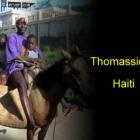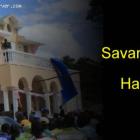2011 Amended Constitution Puts Voodoo Believers on Guard
ADVERTISEMENT
In 1935, a Decree-Law banned voodoo ceremonies, including animal sacrifice to deities. For over a half-century, the Decree-Law stood until the 1987 Constitution annulled Article 297 of the Decree-Law. In another step, Haiti recognized voodoo as an accepted form of faith in 2003.
Recently, voodoo was abolished again by the newly amended 2011 Constitution, published by the Martelly administration. Voodooists, alarmed by struck-down Article 297 ". . . will have to use their own means to protect themselves from any attacks against them", according to priestess Euvonie Augustus.
But President Martelly wants to use voodoo as a magnet to increase tourism in Haiti. As he remarked to the UN, "do you know how many people would like to come to Haiti and try to understand what voodoo is?" Minister of Tourism, Stéphanie Villedrouin, has also been promoting voodoo's mystique for curiosity seekers, as a lever to grow Haiti's tourist trade.
The official party line is practicing voodooists, if caught, will be prosecuted. But word on the street is Haiti needs more tourist dollars than it needs to stop animal sacrifice. The voodoo issue is complex, and until more investigation into how the religion is practiced today, by the majority of voodoo believers, it is best to reserve judgment.
Read more: Voodoo, constitution, 2011 Amended Constitution, Voodoo
« Demonstrators set UNITE Party headquarter on Fire | Main | A Brief History of Haiti Constitution »
Leave a Reply
Name (required) E-mail (required, will not be published)
» »
Our objective is to share with you news and information about Haiti and the people of Haiti. Traditions, habits and the way we were or grew are alive in this site. We highly recommend that you Subscribe to our Newsletter and also share with us some of the things that are memorable and made us unique people.


 Haiti tech Summit
Haiti tech Summit  Haitian Thanksgiving
Haitian Thanksgiving  Thomassique, Haiti
Thomassique, Haiti  Haitians are a Proud People
Haitians are a Proud People  The Town of Savanette, Haiti
The Town of Savanette, Haiti